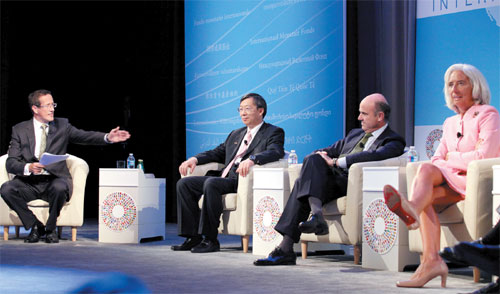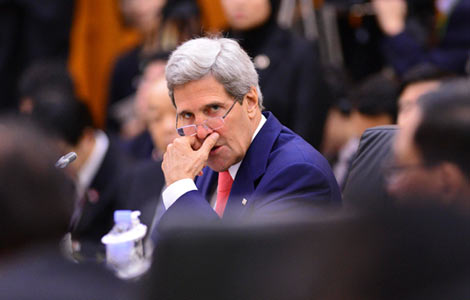IMF cautions over DC drama
Updated: 2013-10-11 11:07
By Chen Weihua in Washington (China Daily)
|
||||||||
|
Moderator Richard Quest (left) of CNN introduces Yi Gang (second from left), deputy governor of the People's Bank of China, at a panel discussion on Thursday in Washington. To the right of Yi are Spanish Minister of Economy and Competitiveness Luis de Guindos and IMF Managing Director Christine Lagarde. Sun Chenbei / China Daily |
Chinese and international financial leaders voiced their deep concerns over the drama unfolding in the US over the raising of its debt ceiling, government shutdown and the possible tapering of quantitative easing (QE) policies.
Christine Lagarde, managing director of the International Monetary Fund, believes a failure to lift the debt ceiling will cause significant disruption and add uncertainty to the world economy.
"It will have fiscal consequences for the United States. It will have financial consequences not just for this country, but across the globe," Lagarde told a panel discussion on the global economy held on Thursday at George Washington University, ahead of the World Bank/IMF annual meeting, which kicks off Friday. But she said she has faith that the issues will be resolved.
With the debt limit of $16.7 trillion to expire on Oct 17, US House Republicans on Thursday offered President Obama a proposal to raise the debt limit through Nov 22 in exchange for a promise to negotiate a solution for a long-term deficit reduction and a tax overhaul, a plan the White House has shown no willingness to accept.
Yi Gang, deputy governor of the People's Bank of China, the country's central bank, also expressed his concerns, saying that the market doesn't like uncertainty.
He emphasized that this is a matter relating to the world's financial market. He believes that with the recovery of the developing economies and also the difficulties facing some emerging markets, adding this budget limit uncertainty would hurt the global economy and its future development.
"I think they should have the wisdom to solve this problem as soon as possible," he said.
China is the largest foreign holder of US treasury bonds. A Treasury Department report shows that China held $1.277 trillion US treasury bonds by the end of July, followed by Japan at $1.135 trillion.
In Brunei, visiting US Secretary of State John Kerry assured Asian nations that the US was committed to resolving the fiscal impasse as leaders from China, Japan and several other countries expressed their concerns over the government shutdown and possible debt default.
Lagarde also hopes the US Federal Reserve will approach its tapering, or an end of easy money, in a gradual and cautious way.
"We recommend gradual, well-communicated dialogue between the authorities," she said, pointing to the somewhat of a spillover effect already seen in countries such as India, Brazil, Russia and the Republic of Korea, where capital inflows have been significant.
Compared with most emerging markets, China is regarded as less vulnerable to the tapering, given China's sustained current account surplus, huge foreign exchange reserve, high savings and capital control.
Yi said that the Chinese economy is very closely linked to other emerging markets. "If you look at raw materials and trade, if the Chinese economy grows, that will also benefit other emerging markets," he said.
An IMF regional economic outlook report for Latin American and the Caribbean said expectations of lower medium-term growth in China have been a key driver of the softening of global commodity prices since the beginning of the year.
Yi agreed that the tapering needs to be dealt with in an orderly and well-communicated way and he hopes that countries can solve their budget issues.
"We need a very stable global economy," he said.
"Also more importantly, China needs foreign trade and investment, we really think that protectionism is bad for the global world as a whole," he said.
Yi dismissed concerns that the Chinese economy is heading towards a hard landing.
While China's economic slowdown in the first half of the year caused wide concerns for the world's second largest economy, Yi believes the third quarter figures show the economy has picked up.
He predicted that this year's growth will be above 7.5 percent, to probably 7.6 percent. "For the foreseeable future, I think China's growth will be around 7 percent," said Yi, adding that it is still very rapid development by world standards. For decades, China has kept a GDP growth rate of over 10 percent.
While Lagarde expressed concerns about the risks of oversized shadow banking in China and the US and called for more supervision, Yi said on Thursday that the problems regarding shadow banking and local government debts are under control now. Shadow banking refers to financial services provided by non-banking intermediaries just like traditional commercial banks.
Yi described the Shanghai Free Trade Zone as a pilot program for broad reform and opening-up policy in China, including financial reform. But he said that in a very small place, it's very difficult to do financial liberalization because funds can move around.
"So in this free trade zone, financial reform will be carried out in a gradual manner," Yi said.
chenweihua@chinadailyusa.com
(China Daily USA 10/11/2013 page1)
Most Viewed
Editor's Picks

|

|

|

|

|

|
Today's Top News
Opportunity knocks for US businesses
KFC needs new faces, not new ad campaign
China's growth rate to exceed 7.5%
US woos Malaysia in TPP talks
Nobel literature winner's work snubbed in China
Trending news across China on Oct 11
Xi ignites Australia's zeal for FTA deal
Fire at Fukuoka hospital leaves 10 dead
US Weekly

|

|
















